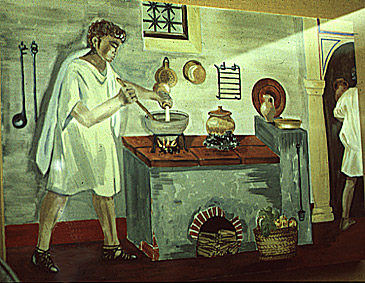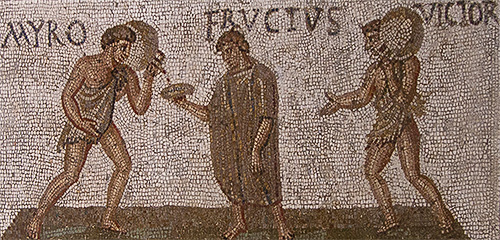 COLLECT
COLLECT
Conserva, Domine, familiam tuam
bonis semper operibus eruditam,
et sic praesentibus consolare praesidiis,
ut propitius ad superna dona perducas.
The verb conservo is "to retain, keep something in existence, to hold up, maintain, to preserve, leave unhurt or safe".
 Erudio is a fun word. It means "to polish, educate, instruct, teach" but in its roots it means "to free from roughness". Rudis describes a state of roughness, wildness, being unpolished or "rude". Hence, someone who is eruditus has been brought out of that state and is now "learned, accomplished, well-informed, skilled, experienced" as in English "erudite" as in one who is cultivated or refined, polished. In some Christian texts, it can also suggest having been instructed in the Good News, evangelized. Many thanks, by the way, to Amy over at open book for calling this series "erudite".
Erudio is a fun word. It means "to polish, educate, instruct, teach" but in its roots it means "to free from roughness". Rudis describes a state of roughness, wildness, being unpolished or "rude". Hence, someone who is eruditus has been brought out of that state and is now "learned, accomplished, well-informed, skilled, experienced" as in English "erudite" as in one who is cultivated or refined, polished. In some Christian texts, it can also suggest having been instructed in the Good News, evangelized. Many thanks, by the way, to Amy over at open book for calling this series "erudite".
In the WDTPRS articles in print form, and slowly but surely here in this blog, we have looked at length at words like familia and famulus. The look like "family", and that is an okay translation depending on the context. It even works for liturgical prayer. However, we mustn’t lose sight of the core meaning of the root of the word, which comes from Latin’s ancient cousin Oscan, fama, which guides the mind to the body of people in an ancient household, including especially the servants. The different words for "family" in Latin include all the servants and staff. It is good to keep this in mind.
Consolare is an imperative, not an infinitive, from the deponent verb consolor. So, there is a parallel in conserva and consolare.
Let’s really push the envelope with our literal version today!
LITERAL TRANSLATION
Preserve unharmed, O Lord, Your family of servants,
having been brought out of wildness into state of cultivation by and for good works, always,
and encourage it with helps close at hand in such a way
that You graciously conduct it through all the way to heavenly gifts.
There is a lot going on in this prayer.
We can focus on the word eruditam for a moment. It is matched up with bonis operibus, and we can’t tell if those are ablative (giving us "by good works") or dative (giving us "for good works’). We could argue it either way. First, think of the Latin phrase, and I am sure you all do, fabricando fabri fimus or "we become carpenters by doing lots of carpentry work". That is to say, as we do something repetitively, we ought to get good at doing it, or at least better at doing it.
 At the same time, think of the tools we use for carpentry, or cooking, or law care, or any other activity we have. Those tools have been shaped and polished and made to a certain shape and specification in order that they be suitable for this or that task. From a piece of raw material or set of parts in no order, they are put into good order so they can fulfill a task. In describing us,
At the same time, think of the tools we use for carpentry, or cooking, or law care, or any other activity we have. Those tools have been shaped and polished and made to a certain shape and specification in order that they be suitable for this or that task. From a piece of raw material or set of parts in no order, they are put into good order so they can fulfill a task. In describing us, God’s family or household as erudita, we can be saying at the same time that he has polished us and instructed us for good works or, at the same time, that we are being continually polished by the very works He made us to perform. Additionally, we were instructed and polished and put in order by the Good Works, indeed the Supreme Works, of God the Father through all of salvation history, culminating in the Cross, and continuing in the Church through the work of the Holy Spirit. I love the fact that semper, "always" is embedded betwixt bonis and operibus. This lovely rhetorical separation by semper lends weight to what I have been saying about the overlapping meanings.
God’s family or household as erudita, we can be saying at the same time that he has polished us and instructed us for good works or, at the same time, that we are being continually polished by the very works He made us to perform. Additionally, we were instructed and polished and put in order by the Good Works, indeed the Supreme Works, of God the Father through all of salvation history, culminating in the Cross, and continuing in the Church through the work of the Holy Spirit. I love the fact that semper, "always" is embedded betwixt bonis and operibus. This lovely rhetorical separation by semper lends weight to what I have been saying about the overlapping meanings.
The prayer brings to mind several images. Ut brevis sim, we can hear in it the abovementioned theme of the household of servants which has been prepared and trained both for and by good works. Think of someone who has been brought in to a new environment and needs training. In the ancient world perhaps some rough bumpkin brought to the villa and then taught many things so that he or she might serve properly in the house, as opposed to the field hands. On the other hand, those same field hands has a lot to learn. 
Furthermore, they must take rough uncultivated land, rough it out by pulled stumps and rocks, and make it suitable for cultivation. They must also defend the land and flocks and crops. They must defend not only their own turf, but also the whole state. Therefore eveyone at times is brought into the military. There is military language in the prayer today. In fact, there is nearly always military language in Latin prayers. In this case, "raw recruits" need to be trained up for the missions they must undertake. Those same missions make them seasoned troops. Also, these same ancient soldiers, especially the Romans, when they stopped from their march, would always entrench and fortify their position by digging and building defences. Praesentia … praesidia drips with this image of military defences. Also, praesidium can have the meaning of remedium, which we saw yesterday.
I hope that some of you who are faily new to the WDTPRS project and who may be following these posts each day of Lent are seeing how the prayers of Holy Mass in this "Strong Season" are thematically interconnected.


































But consider the poor soul who attends Mass this morning and instead hears the
ICEL version:
Father,
teach us to lead good lives,
encourage us with your support
and bring us to eternal life.
Will he comprehend that “there’s a lot going on in this prayer”? Or perceive the depth and power of the prayers of Holy Mass in this Lenten season.
I have some familiarity with Amharic, the national language of Ethiopia. It’s a beautiful and fasincating Semitic language with a wonderful, ancient syllabic alphabet. But it’s word-poor: k’onjo, for example, does multifarious duty for “beautiful”, “sweet”, “nice”, etc. If you had a good time playing soccer: k’onjo. If the food tastes good: k’onjo. If a girl is pretty: k’onjo.
These ICEL guys wanted to pretend that English is a language like that–as if it had no history, no rich shades of meaning, no elastic and subtle differences in phraseology. Everything to them was just: k’onjo.
well now . . the envelope got slightly ripped, i think. “familia” does have the extended sense of “household” including servants, and it can mean just the servants as a group. and it is true we are bidden to serve each other for the love of Christ, that one of the titles of the pope is “servus servorum Dei”, and that the Virgin Mary’s sweetest “yes” was spoken as “ancilla Domini” (lk.1:38); but through our baptism in the Lord we are sons and daughters fo God and we are definitely not servants or slaves (which was effectively the same thing in apostolic times). “iam non dico vos servos, quia servus nescit quid facit dominus; vos autem dixi amicos . . ” (jn.16:15; cf. ro.8:15f and also cf. 1p.2:9f). the vatican council took “the people of God” as a kind of rallying call, but it also developed the theme of the “family of God” (LG no.28;GS nn.32,40,43 etc.)and the african bishops in the special assembly for africa of the synod of bishops adopted just this very term as containing
some very intimate truth with special resonance in african society: JP II, post-synodal ap. exhort. ecclesia in africa (1995), n.63 etc. by no means was it ever intended to convey by “family” anything other than the free and loving association of equals under the benign care of a merciful and loving Father. now, of course, the Church is in no way constrained by any of the metaphors which are used to illuminate her own nature or to describe the relationship of her members (to each other, to God and to the Church) and her own
relationship to God (LG nn.6f gives an overview); but “servants of God” expresses a very partial view of our relationship to God, the totality of which is expressed in the simple child:parent relationship at the centre of which is love. the master:servant relation looks only at the quality of service and obedience. love comprises everything, including service and
obedience, and the Holy Father has reminded us that “it embraces the whole of existence” (Deus caritas est, para.7) and he finely described salvation history as a “love story between God and Man (ibid., para.17).
so, where we find the latin “servus” or “ancilla” in a prayer, we should translate it honestly, but where we find “familia” (there was no distinct word for the nuclear family, since the concept had no meaning in a roman family), we can either translate it in the restricted sense of “retinue” or “body of slaves”, or as “family” in the wider inclusive sense. there is no warrant in latin or english for “family of servants” which is either meaningless or a contradiction in terms.
ROFL!! I knew if I dangled something like “family of servants” in front of Martin, he would chime in with a long, minimally punctuated comment!! And all before 1500h my time, before I need to head out to the library! Kudos.
Hey Martin! How about spending some more time with that nifty Shift key? It’s right there next to where the little fingers are normally situated, the fingers servants in the familiae domus called the digitus minimus.
o{]:¬)
Here’s my contribution:
Keep safe, O Lord, your household
ever schooled by good works
and as you console us by your present helps,
so lead us mercifully to the gifts above.
Looking at the 1973 ICEL version that Mr. Edwards gives us above, one understands why not a few priests have real problems of conscience using the 1973 “Sacramentary.” What happens to “lex orandi, lex credendi”? One should not wonder why there are any number of “private” translations in use. Is it licit? A complex question. When many years ago I questioned one Roman prelate (who shall go unnamed) about the lame translation of the “Ecce Agnus Dei, ecce qui tollit peccata mundi. Beati qui ad cenam Agni vocati sunt,” he answered with a smile that said everything, “Father, if the translation is broken, fix it!”
Marco, you can’t believe how many times I have been tempted to use my own version when I am called upon to use English. But, I restrain myself.
I don’t think we should be required to do penance during Lent when we have to use that ICEL version, do you?
In any event, I say Mass in Latin everyday right now, including the readings. It’s just better that way, especially for a someone in the LATIN Church. I guess I will continue with my regular Lenten program.
o{]:¬)
Father,
I am fast becoming a regular here at WDTPRS. Gratias ago for the daily dose of Latin, which I very much enjoy.
You are very welcome!
o{]:¬)
i gladly accept the gentle reproof. my fault has been in trying to write directly in the comment box. from now on i will compose out of the box and then paste it in.
Martin, your each and every comment is a treasure and a solid contribution.
The declared purpose of the WDTPRS project has always been to help people understand better and love more deeply the content of the prayers.
Content goes beyond the grammars and dictionaries. The content is a Person. So, in addition to the restraints of time, that is why I will at now and then both push the envelope and goes less far into the details as I might like to.
o{]:¬)
UK/Ireland Breviary
Protect your family, Lord,
trained as it is by the constant exercise of good works,
Strenghten us with your consoling presence,
and lead us to the joys of heaven
One can understand why a certain American Latinist of my acquaintance tried to use the UK/Ireland breviary when he had to celebrate the liturgy of the hours in the vernacular.